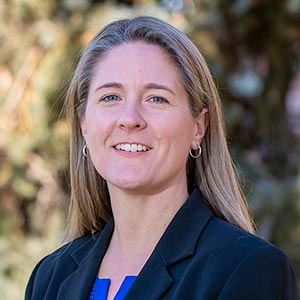Dietetics specialization
If your goal includes promoting health through nutritious and safe food, the Dietetic specialization is for you!
You will experience:
- A balanced curriculum including courses in the biological, physical and social sciences
- An exciting variety of food and nutrition courses taught by expert faculty
- Learning experiences that challenge students to apply their nutrition knowledge and skill to real-world situations
- Opportunities to learn about the profession of dietetics from local practitioners
- Personalized academic guidance from professional advisors
Start your application today
As a member of the Wolf Pack family and a nutrition major, you'll receive a science-based education that will set you up for success.
More about dietetics
We strive to prepare students for rewarding careers in food, nutrition and dietetics. Many of our graduates go on to become Registered Dietitian Nutritionists. These professionals are the food and nutrition experts who translate the science of nutrition into practical solutions for individuals and groups that serve to improve health and prevent diet-related diseases.
Becoming a Registered Dietitian Nutritionist
Nutrition students enrolled in the Dietetics Specialization complete the Didactic Program in Dietetics (DPD) curriculum which includes a variety of courses specifically selected to meet the standards established by the Accreditation Council for Education in Nutrition and Dietetics (ACEND). Completion of an ACEND-accredited DPD is the first step in becoming a Registered Dietitian Nutritionist.
Eligible program graduates will receive a signed DPD Verification Statement. This document is required to begin an ACEND-accredited supervised practice program (also known as a Dietetic Internship Program). PLEASE NOTE: Completion of the DPD does not guarantee acceptance into a supervised practice program.
Upon successful completion of a supervised practice program, graduates are eligible to take the Commission of Dietetic Registration’s credentialing exam to obtain the RDN credential.
In Nevada, practicing RDNs must also be licensed by the Nevada Division of Public and Behavioral Health.
Accreditation
The Didactic Program in Dietetics (DPD) at the University of Nevada, Reno is accredited by the Accreditation Council for Education in Nutrition and Dietetics of the Academy of Nutrition and Dietetics
120 South Riverside Plaza, Suite 2190. Chicago, IL 60606-6995
(312) 899-0040 ext 5400
www.eatrightpro.org/ACEND
Important resources for prospective & current students
Admission requirements: Applying and being accepted to the University of Nevada, Reno allows students to pursue the Bachelor of Science Nutrition- Dietetics Specialization. There is no additional application process.
Tuition & fees: Tuition and fees are established by the Nevada System of Higher Education Board of Regents. In addition to tuition and fees, students can expect to spend approximately $800/year for textbooks.
Housing & Dining rates: Rates vary by hall, occupancy and meal plan.
Academic calendar: All important dates and deadlines are available in the online academic calendar.
Financial aid: Financial aid is available. Don’t hesitate to contact the Office of Financial Aid and Scholarships for help.
DPD Handbook: Graduation and program completion requirements, and other important information regarding the program can be found in the handbook.
Assessing Prior Learning
Transferring credits: Learn more about what types of coursework and credits transfer to the University of Nevada, Reno.
More about the Didactic Program in Dietetics
Our mission:
The Didactic Program in Dietetics (DPD) will effectively prepare students for accredited supervised practice programs leading to eligibility for the CDR credentialing exam to become registered dietitian nutritionists, for graduate programs, and/or for entry-level employment in nutrition and dietetics. The DPD will foster life-long learning in the pursuit of excellence; and a commitment to improving the nutritional health of our diverse local and global communities through evidence-based policies and practices.
DPD Program Goals and Objectives
Program Goal 1: Program graduates will be prepared for post-baccalaureate programs including supervised practice and graduate programs, and for entry-level nutrition employment.
Objectives for Goal 1
- At least 80% of program students complete program requirements within 3 years (150% of planned program length).
- At least 40% of program graduates apply for admission to a supervised practice program prior to or within 12 months of graduation.
- Of program graduates who apply to a supervised practice program, at least 75% are admitted within 12 months of graduation.
- The program’s one-year pass rate (graduates who pass the registration exam within one year of first attempt) on the CDR credentialing exam for dietitian nutritionists is at least 80%.
- Supervised practice program directors will rate program graduates’ preparation for supervised practice as satisfactory on at least 75% of the knowledge and learning outcomes.
Program Goal 2: Program graduates will be equipped with the necessary knowledge and skills to improve the nutritional health of diverse communities.
Objectives for Goal 2
- At least 70% of program graduates who complete the Graduate Survey will express self-efficacy regarding their ability to improve the nutritional health of diverse communities.
- At least 70% of program graduates who complete the Graduate Survey will express satisfaction with the inclusion of professionalism and ethics in their nutrition courses.
Outcomes data relative to the objectives listed above are available upon request.
Dietetics Quicklinks
Faculty advisors for dietetics students

Jamie Benedict
Last names A-F

Karon Felten
Last names G-L

Jolyn Wirshing
Last names M-P

Maureen Molini
Last names Q-S

David St-Jules
Last names T-Z